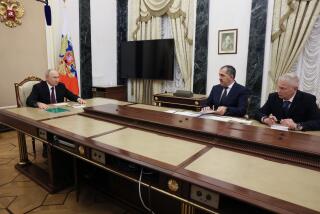Karzai Shifts 3 Militia Leaders to Civilian Posts
- Share via
KABUL, Afghanistan — Afghan President Hamid Karzai announced Tuesday that three powerful commanders would be removed from their militia posts and shifted to civilian positions in a bid to consolidate his power and rein in private armies ahead of the October presidential election.
The move was made to ensure that the election is free and fair, said presidential spokesman Jawed Ludin during a news conference Tuesday.
The commanders include Atta Mohammed, one of the most powerful factional leaders in the country and a key player in the defeat of the Taliban regime in 2001. Mohammed has commanded a private militia with 5,400 fighters based in the northern city of Mazar-i-Sharif. His forces have skirmished frequently with those of his rival, Abdul Rashid Dostum.
Atta has been appointed the governor of Balkh province.
“Our aim was to give people assurances,” Ludin said. “This is part of a series of changes that will continue. If concern exists in some parts that people are facing a security threat, it is the government’s duty to provide security and allow safe and free elections.”
The other commanders are Hazrat Ali in the eastern city of Jalalabad, who has been moved to the post of police chief for Nangarhar province, and Khan Mohammed in Kandahar, who was named that southern city’s police chief.
It was not immediately clear whether the appointments would break the three commanders’ ties to their militias. Under a $165-million United Nations disarmament program, all three forces are in the process of being disarmed and their fighters returned to civilian life, though the effort has progressed slowly.
Karzai has said Afghanistan’s private militias pose a greater threat to the country’s security than the deposed Taliban.
Last week, he summoned the nine most powerful commanders in the country to the capital and later decreed that those who did not cooperate with the disarmament plan would be considered “rebellious” and “severely punished.”
The factional leaders control about 60,000 fighters, according to the U.N. By contrast, Karzai has 10,000 soldiers in the Afghan national army.
The U.N. is seeking to disarm 60% of militia members by the election; so far only 10,000 fighters have laid down their weapons. The world body has said that unless the private armies are disarmed, the elections will not be considered free and fair.
Parliamentary elections have been delayed until next spring because of security concerns.
More to Read
Sign up for Essential California
The most important California stories and recommendations in your inbox every morning.
You may occasionally receive promotional content from the Los Angeles Times.













